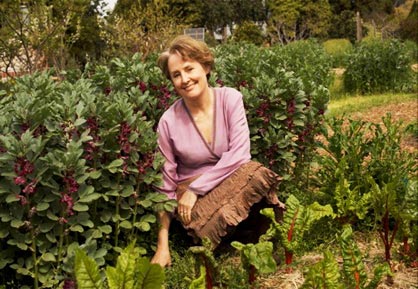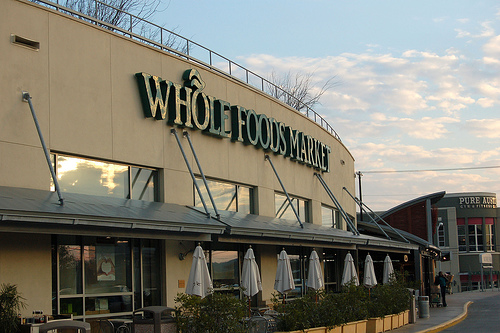 Alice Waters.I don’t know Alice Waters. Yet I often feel like I know Waters’ public self — the lilting voice, the distinctly emotive diction, the studied bohemianism — a little too well.
Alice Waters.I don’t know Alice Waters. Yet I often feel like I know Waters’ public self — the lilting voice, the distinctly emotive diction, the studied bohemianism — a little too well.
So I wasn’t surprised when I picked up Waters’ latest book, 40 Years of Chez Panisse: The Power of Gathering, and felt like I was holding a personal scrapbook.
It’s a lovingly crafted book, full of rare photographs and intimate details that chart the history of the restaurant. In addition to pages of photos, menus, and highly stylized event posters documenting the restaurant’s milestones (including the 10th, 20th, and 30th anniversary parties), Waters has curated a series of short written memories from some of the more influential food professionals and personalities, including Calvin Trillin, Ruth Reichl, Michael Pollan, and other member of the extended “Chez” community. But that’s not where it ends; Julia Child, Secretary of State Hillary Clinton, the Dalai Lama, music critic Greil Marcus all appear in the book. There’s also an audio tribute by the Kitchen Sisters. The downside to all this is that it can also come across like an insular, over-the-top self-canonization of an institution that is already seen as an emblem of inaccessibility.
For fans of the restaurant and the lifestyle component of Waters’ work, the book functions like a collector’s item. But 40 Years of Chez Panisse will remind those engaged in the food movement just how quickly Waters’ lifestyle brand can eclipse the very real and necessary work that she’s done to change our food system.
Waters and the world she represents tend to polarize people who really care about food. In direct and indirect ways, we are told that we’re supposed to either make pilgrimages to her restaurant (or any one of the dozens that have been built out of her legacy) or despise her for enjoying her celebrity status quite so much. To be honest, many of us have probably done both — the point is that she can inadvertently cause us to take sides.
In a preface to a recent interview with Waters and the People’s Grocery’s Nikki Henderson on Mother Jones, Tom Philpott warned: “If the food movement becomes dominated by its white-tablecloth faction, it risks devolving into a high-end tasting club that has little impact on the broader culture.”
I see this polarization and the conversation it propels us to have as entirely worth our time. I’ve thought quite a bit about these two “factions” — those driven by their interest in cooking and eating, and those who see food as a compelling, immediate example of what needs fixing about today’s world — from a political, environmental, and justice-oriented standpoint. But thankfully, I’m noticing that it’s becoming more and more difficult to tell where people fall on this spectrum. Mark Bittman is one of my favorite examples: He went from teaching people how to cook everything to writing a fiercely political weekly column on things like irradiation, CAFOs, and the pitfalls of corporate self-regulation. Michael Pollan, meanwhile, has been reminding us of the pleasures of eating and cooking.
Waters believes that both matter; she insists we can deconstruct our cake and eat it, too. And, if you live in a major metropolitan area, its unlikely that you are more than two degrees from the impressive diaspora of chefs, cookbook authors, and restaurateurs who spent at least some period of time cooking at Chez Panisse. It’s also likely that you may have been impacted by the Edible Schoolyard, her work with the Yale Sustainable Food Project, the Rome Sustainable Food Project, or within the larger Slow Food movement.
As the restaurant enters its fifth decade, Waters is clearly considering her legacy. “I can’t imagine celebrating [another decade],” she told Amanda Gold in the SF Chronicle earlier this week. “Forty years is a passage of time and really the end of a generation.”
As she starts to think about passing the torch, maybe that’s why she’s stepped up the serious side of her life’s work. One good example is Edible Education 101, the class that Waters has arranged to have Michael Pollan teach this fall at UC Berkeley. Not only did she invite People’s Grocery director and food justice advocate Nikki Henderson to co-design the class, but the curriculum includes a tough-minded group of speakers, including the straight-shooting nutritionist Marion Nestle, Diet for a Small Planet author Frances Moore Lappé, Stuffed and Starved author Raj Patel, and Fast Food Nation author Eric Schlosser.
Waters’ critics have long cast the Edible Schoolyard as a phenomenon that could only take place in Berkeley*. This week, Waters might be building a platform from which to prove those critics wrong: Along with rebranding the Chez Panisse Foundation as the Edible Schoolyard Project, Waters and her staff are raising what promises to be an impressive sum in order to fund edible education work on a national level. (The organization will host an array of celebrity chef dinners this weekend with prices ranging from $250 to $1,000 a ticket, and a series of grassroots meals in nearly 80 different locations around the country called Eating for Education).
Waters’ more political audience members can undoubtedly get behind both these efforts. But I’m equally struck by another, more straightforward testament to Waters’ influence on the food system: her abiding, unflinching support of small farmers and food producers.
A few months back, I had the pleasure of visiting Sunny Slope Orchard, a tiny “micro-farm” in Vacaville, Calif., that sells a great deal of their fruit to Chez Panisse. We were there on a rescue mission, after a late-season rain all but destroyed the second half of their precious Blenheim apricot crop.
Farmer Bill Spurlock and his wife Fern Henry (a couple who epitomize the Slow Food ethos with their lovingly precise organic methods and land stewardship) guided my small group around the property. They offered us samples of their incredibly sweet figs, apricots, and plums and told us about their soil and water management techniques. At one point, when we approached a plum tree with an especially unique history, I asked: “Do you tell that story when you market these plums?” My question was met with blank stares, until Bill reminded me, “Chez Panisse buys our fruit. We don’t need to market it at all.”
* There are currently five other schools with gardens co-branded with the Edible Schoolyard name, b
ut none have received funding from the Chez Panisse Foundation so far.



